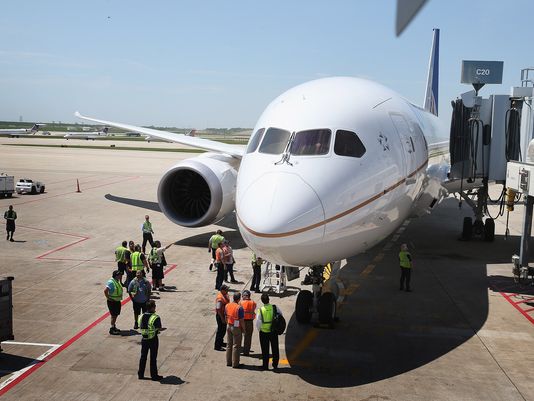Tokyo-bound Boeing 787 Dreamliner diverted to Seattle
SEATTLE (AP) — A Boeing 787 flying from Denver to Tokyo diverted to Seattle because of an oil filter issue, a United Airlines spokeswoman said.
An airline maintenance team was inspecting the jet after Flight 139 landed normally Tuesday afternoon at Seattle-Tacoma International Airport, United spokeswoman Mary Ryan said in an email statement.
United just put its 787s back in the air May 20 after smoldering batteries on two 787s owned by other airlines prompted authorities to ground the planes in January.
The Tokyo-bound jet's problem was "completely unrelated to any battery issues," Boeing spokesman Kate Bergman told The Seattle Times on Tuesday evening.
"We are aware of the situation, and we're working with United to help however they need us," Bergman added.
In her statement, the United spokeswoman said the crew decided to land in Seattle because of "an indication of a problem with an oil filter."
Asked whether the latest 787 issue raised any concerns with United after the recent battery issue, Ryan said she did not immediately have any additional information.
The airline provided the flight's approximately 200 customers with hotel rooms and planned to fly them to Tokyo on Wednesday, Ryan said.
When it returned the 787s to service last month, Chicago-based United said it planned to use the jets on shorter domestic flights before resuming international flying June 10 with Denver-to-Tokyo service as well as temporary Houston-to-London flights. It's adding flights to Tokyo, Shanghai, and Lagos, Nigeria, in August.
Those long international flights are the main reason the 787 exists. Its medium size and fuel efficiency are a good fit for long routes.
At the Paris Air Show on Tuesday, Boeing Co. won major orders from five customers, including United, for a stretched-out version of the 787.
Boeing announced the formal launch of its 787-10 program at the air show and said it already has commitments for 102 jets from the five customers. The new 787-10 lists at $290 million, making the deal worth nearly $30 billion at full price, although customers often negotiate deep discounts.
United remains the only U.S.-based airline to fly the 787, which is steadily winning customers after being beset with problems concerning lithium-ion batteries on two Japanese carriers. The plane, like its newest rival the Airbus A350, uses lightweight materials and new engine technology to cut down on fuel consumption at a time of rapidly increasing jet fuel prices.
The two battery incidents in January included an emergency landing of one plane, and a fire on another. Federal authorities lifted the grounding order on April 19.
The incidents never caused any serious injuries. But the grounding embarrassed Boeing and disrupted schedules at the affected airlines.
The 787 uses more electricity than any other jet. And it makes more use of lithium-ion batteries than other jets to provide power for things like flight controls and a backup generator when its engines are shut down. Each 787 has two of the batteries.
Boeing never did figure out the root cause of the battery incidents. Instead, it redesigned the battery and its charger. The idea was to eliminate all of the possible causes, 787 chief engineer Mike Sinnett has said.
Copyright 2013 The Associated Press. All rights reserved. This material may not be published, broadcast, rewritten or redistributed.










